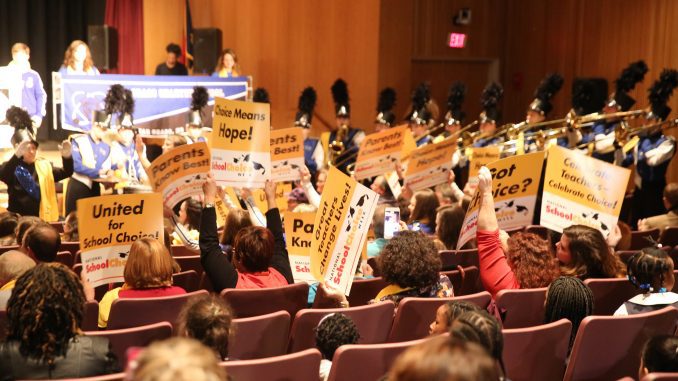
Claims that public charter schools encourage segregation grow louder every day.
According to a recent John Locke Foundation/Civitas poll, nearly 23% of North Carolina voters cite de facto segregation as “the most convincing reason” to oppose parental choice programs in education. This is a 5% increase in just one year.
Some even claim North Carolina’s school choice movement has racist roots. This view draws on 1950s-era white resistance to school desegregation. Choice must be racist, the thinking goes, because an unconstitutional plan once sought to decentralize school decisions, giving them to parents to avoid integrated schools.
This argument against choice is false and inflammatory. It distracts from an issue that remains urgent 67 years after Brown v. Board of Education: providing minority students with an excellent education. School choice is one of the most “antiracist” things we can do.
How do we know? We do it every day.
We are the leaders of two public charter schools in North Carolina serving mostly minority and low-income students. We caution anyone about making an association between public charter schools, choice and segregation.
The primary goal of our public schools is to provide a quality education to all students. Yet, economic disparities and shifting demographics have made this task increasingly difficult. As a result, parents are looking for options outside the traditional system. More parents are drawn to the public charter model, which empowers them to choose the school that best fits their child’s needs — rather than being assigned by district administrators.
At our charter schools, we strive to provide our students with an excellent education. In 2019, both of our schools earned a report card grade of “B.” Both schools exceeded state benchmarks for academic growth.
Segregation is when someone blocks a door, not when you don’t like which open doors are freely chosen.
Fortunately, charter statute grants us the freedom and flexibility to design curricula and utilize innovative teaching methods tailored directly to the challenges of our students. At Sallie B. Howard School in Wilson, where JoAnne Woodard and Sandeep Aggarwal lead school operations, students pursue a performing arts curriculum. Nearly 100% of 8th graders are accepted into the local early college program.
At Alpha Academy in Fayetteville, where Eugene Slocum is superintendent, minority students score 15% higher, on average, than their peers in surrounding counties. They also offer an academic component through the Katherine Johnson STEM Institute.
Many other charter schools in North Carolina provide students with a quality education. Parents must like what they see. This year, even as overall public K-12 enrollment declined, charter schools added students at every grade, according to the state’s new charter school report, and 78% of NC charters have waitlists.
What about diversity? Data from the charter report show that, compared to traditional public schools, North Carolina charters enrolled a higher percentage of black and white students, as well as students of two or more races.
Efforts are underway to increase charter diversity and access further. Spurred by the NC ACCESS Program, 42 charter schools currently utilize weighted lotteries to prioritize educationally disadvantaged students.
Some charter schools will end up enrolling higher numbers of minority students than the state average.
Ours did. Successful schools with a certain demographic often attract other students who reflect that racial makeup. This isn’t segregation. It’s voluntary association — in other words, choice. This is a critical distinction.
Let’s be clear: Segregation was legally-sanctioned separation based on race, often enforced with violence. A divisive, highly charged term, segregation carries a painful history for many in this country.
School choice does not consign us to repeat this painful history. Far from it: Choice empowers us to change the present and the future.
Some will not like it.
But that does not — should not — imbue choice with racist overtones. This description utilized by Choice Media says it best: “Segregation is when someone blocks a door, not when you don’t like which open doors are freely chosen.”
Conflating parental choice with segregation is polarizing and ultimately pointless because it keeps us from the great educational imperative: boosting student achievement. It makes no sense to condemn charter schools for their freedom.
Instead, we should focus on collaboration, learning from the experience of charter schools that succeed in closing the achievement gap.
We must “awaken from our illusion of separateness,” as peace activist Thich Nhat Hanh has noted. Such an awakening should lead to unity among public educators around our common cause. That cause, providing students with an excellent education, is ever more urgent following the losses and pain of the pandemic.
Let us stand united, then — with schoolhouse doors open wide.
Dr. JoAnne Woodard is founder and executive director of Sallie B. Howard School of Arts & Sciences in Wilson. Eugene Slocum is superintendent & CEO of Alpha Academy and the Katherine G. Johnson STEM Institute in Fayetteville. Sandeep Aggarwal is assistant director and dean of business, technology, and cultural affairs at Sallie B. Howard School of Arts & Sciences in Wilson.



